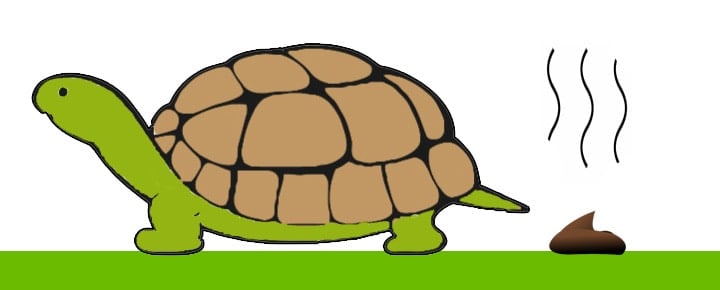
Ah poop, the source of school yard jokes from time immemorial. There is however a lot to be gleaned about the health of your tortoise and what has or hasn’t been passing in through their ‘front end’ by judging what comes out of their rear end.
Distinguishing Between Poop and Pee
The first thing to know about tortoise waste is that what you might suspect is poop might actually be pee. One of the most distinguishing features of tortoise waste is the white pasty substance that appears either with or without the more familiar brown or dark green poop. Rather than fecal matter this substance is in fact made up of urates, a by product of protein digestion typically found in urine, and indeed stored and released from the bladder in the case of a tortoise.
This urate paste may or may not be released along with liquid urine, so sometimes the deposit will be fairly dry, hence why this substance can be confused with poop.

Tortoise poop on the other hand looks exactly as you would expect it to; brown or dark green depending on what your tortoise diet consists of. Either are perfectly normal and don’t present any cause for concern.
Dry Feces and Urates
One thing that you can determine by observing your tortoise’s poop is whether or not he or she is dehydrated or not.
A dehydrated tortoise may pass noticeably dry or crumbly poop, but more likely the white urate paste will appear lumpy and granulated, which is a sure sign of lack of hydration.
Other signs of dehydration include:
- Lethargic behaviour
- Skin that appears dry and flaky
- Being underweight
- Sunken eyes
- Shell pyramiding (although this often occurs after many years of prolonged neglect)
If you suspect dehydration is afflicting your tortoise you should immediately provide access to fresh water and fresh vegetation to encourage your tortoise to take on water. It’s also a good idea to get into the habit of soaking your tortoise in a shallow bath (such that the head is not submerged) so that they are able to take on water from both their mouth an cloaca. Using a spray bottle to mist their enclosure also provides further hydration to the shell and skin.
If you have already been doing your best to hydrate your tortoise but they still show signs of dehydration it would be wise to make an appointment with your vet.
Runny Feces
If your tortoise’s feces appears overly runny or diarrhea like then there’s a good chance that something about their diet is causing them digestive issues.
Incorrect Diet
First things first you should make sure their diet closely matches what they would eat in the wild; for most species this will consist of green leafy weeds and vegetables. What it certainly won’t consist of is an overly sugary diet, with fruits being the usual source of sugar if this is the issue.
Whilst fruit is a nice occasional treat, it really should be limited to very rare occasions and even then only a minimal amount should be provided. Too much fruit can upset the fauna within your tortoise’s gut, causing watery poop.
Another issue can be the lack of dietary fiber, although this is less common given that leafy vegetables are a good source of fiber. If for example you’ve made the mistake of feeding your tortoise a diet comprised solely of iceberg lettuce, then this could be a very real issue given that iceberg lettuce isn’t a particularly good source of anything other than water.
You can learn more about what foods you can and cannot feed to your tortoise here.
Parasitic Infection
Besides an incorrect diet being the culprit of runny poop, your tortoise may also fall foul to a parasitic infection in their gut. If you’ve ruled out diet as being the cause, then speak to your vet about doing further investigation, who may then recommend collecting a sample of poop for analysis.
Besides runny poop parasites such as threadworms may also present themselves in your tortoise’s poop, sometimes visibly so. In this case you’ll obviously have a much easier time determining that something is wrong.
Unfortunately however worms are often so small that they can’t be seen, so you’ll have to look out for other symptoms such as diarrhea, lethargy and loss of appetite.
Frequency of Pooping
In my experience there doesn’t seem to be a whole lot of rhyme or reason to when a tortoise poops or pees. In fact, I am always astonished to see my tortoise consume mountains of food for several days in a row and then seem to take days to pass the smallest nugget or poop thereafter!
Peeing is no less predictable, although the two do seem to take place at the same time in a lot of cases.
I wouldn’t be overly concerned if you see no evidence of poop for anything up to 4 or 5 days at a time and your tortoise seems otherwise healthy and their behaviour is normal.
The other possibility if you aren’t witnessing much in the way of poop appearing in your tortoise’s enclosure is that they might be eating it before you can get eyes on it. Yes, as disgusting as that sounds it does happen, and more importantly it’s perfectly normal!
If you’re certain your tortoise isn’t pooping frequently enough, and their behaviour is off (for example they are not eating properly) then again it would probably be worth a visit to the vet as there is the possibility that they have something obstructing their gut. This is especially likely to be the case if you have been using a substrate that is likely to cause compaction if eaten.


